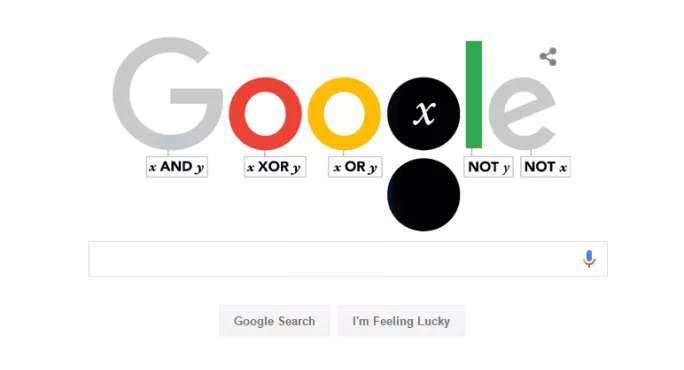Why students must learn about the mathematician whose work paved the way for computers

Today, as celebrated by Google’s doodle, is the 200th birthday of George Boole, the self-taught mathematical genius whose pioneering research on logic and algebra paved the way for the information age we enjoy today.
Boole was from Lincoln and became the first professor of mathematics at University College Cork (then Queen’s College Cork) in 1849. Every laptop, tablet, mp3 player and smartphone today, as well as the internet and its search engines, owes its existence to Boole’s mathematical legacy.
Boole’s aim was to bring logic into mathematics, to create an algebra of logic amenable to mathematical manipulation. By putting logic at the core of his work, he helped build a system which translated complex statements into simple true or false values. A system which 80 years later would be applied by Claude Shannon at MIT to telephone switching circuits, which formed the basis of computer hardware.
For more than two millennia logic has been the basis of rational argument. We know that logic is essential for learning, not just in mathematics and sciences, but in all parts of the curriculum. Being able to see when one proposition follows from another, to recognise correct or flawed logic, and in general to think critically, are vital not only to the school student but to the informed citizen.
In the absence of motivation, however, logic can be rather dull and lifeless to teach. Sadly, interest in logic and in teaching logic has decreased over time to the point that it is no longer a core component of the British and Irish school curriculum. Yet logic remains essential to the development of reasoning. It is especially relevant in Stem (science, technology, engineering and maths) subjects at a time where we need ever increasing numbers of bright, talented mathematicians, engineers and computer science graduates. It is somehow ironic, and slightly worrying, that in a world where (Boolean) logic surrounds us completely in the shape of smartphones and laptops, our understanding of such logic wanes.
University College Cork Brings Boole2School is an attempt to reverse this decreasing interest in logic by providing motivation from the student’s own experience. The idea is to introduce the basic notions of logic to schoolchildren, at all levels from late primary to sixth form, using examples from computer games and logic puzzles. The Boole2School lessons introduce Boole as a person and explain how the Boolean operators AND, OR and NOT are used. We use the computer games Candy Crush Saga and Minecraft as illustrations where the application of Boolean logic is sufficiently close to the surface that we can easily explain the connection to children as young as eight.
Our use of computer games to convey the fundamental concepts of logic has proved somewhat controversial, especially in the light of the recent OECD report Students, Computers, and Learning: Making the Connection, which indicated that member states with below average computer time in school have better learning outcomes (in Pisa mathematics and literacy) than states where computers were used for five or six hours a day.
We are certainly not advocating that children should spend a lot of time in school playing computer games, although some computer games, such as Minecraft, encourage a high level of creativity in the player. But the OECD report recommends that we should embrace modern technology, and instead of “adding 21st-century technology to 20th-century teaching methods” we should explore how best to incorporate it into our classrooms. The presentation of logic in UCC’s Boole2School programme through the medium of computer games is consistent with that.
Boole’s logic laid the foundation of computer software. Until the early 1980s computers were large machines dedicated to solving complex mathematical and computational problems like weather forecasting or putting men on the Moon. In the modern era we have microprocessors in portable devices allowing us to carry out an enormous range of everyday tasks - reading, listening to music, researching, travelling, shopping. Progressive miniaturisation has been the key; today’s transistors, at 15 nanometres in size, are no more than 45 times the size of an atom of silicon.
Even though Boole’s contributions to logic and algebra are at the heart of these developments his name is not well known. In this bicentenary year we seek to redress the balance, and to tell Boole’s story. Along the way we have spoken to many audiences - computer scientists, engineers, the IT industry and the general public - at home and abroad.
Boole2School is how we’re addressing the younger generation. Through age-specific lessons that can be downloaded from our website, we are encouraging teachers worldwide to engage their students with Boole’s legacy by giving a lesson on logic today, the 200th anniversary of his birth. Teachers of more than 55,000 students from 31 countries have already signed up and we encourage you to do likewise. We will keep the lesson plans available indefinitely.
Professor Patrick Fitzpatrick is emeritus professor of mathematics at University College Cork. Find information on UCC Brings Boole2School and teacher registration here.
Want to keep up with the latest education news and opinion? Follow TES on Twitter and like TES on Facebook
Keep reading for just £1 per month
You've reached your limit of free articles this month. Subscribe for £1 per month for three months and get:
- Unlimited access to all Tes magazine content
- Exclusive subscriber-only stories
- Award-winning email newsletters